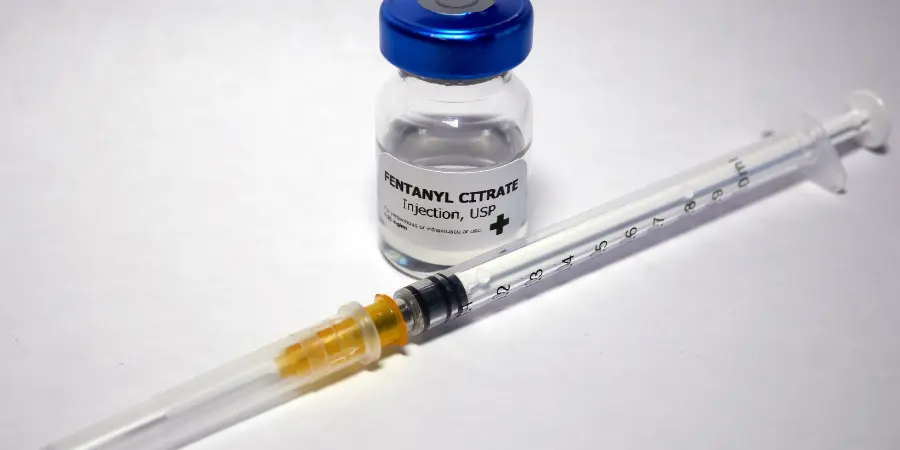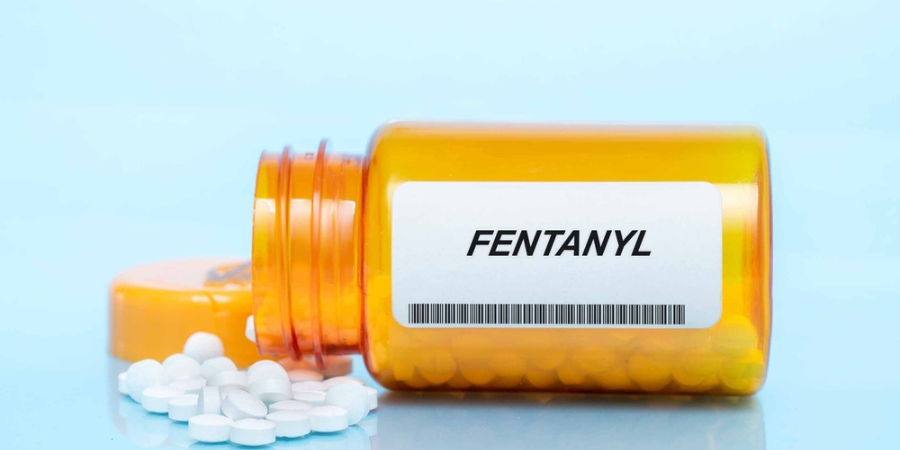
Written by:

Medically Reviewed by:
Last Updated:
October 22nd, 2025
Fentanyl Addiction | Symptoms, Effects and Treatment
Fentanyl is one of those drugs we mostly hear about in other countries. News stories from the US dominate the conversation, filled with phrases like ‘opioid epidemic’ and ‘record overdose deaths. Because of that, it’s easy to assume fentanyl isn’t something we need to worry about here in the UK.
But it’s that same assumption that can let a problem slip in quietly. This page explores what fentanyl is, how addiction can develop and how to get the support you need if you find yourself in fentanyl’s powerful grips.
What is fentanyl?
Fentanyl is a synthetic opioid used in medical settings to manage severe pain, especially for people recovering from surgery or dealing with advanced cancer. It’s incredibly potent, up to 100 times stronger than morphine and available as patches or lozenges when prescribed legally.
Even small amounts of fentanyl can be lethal, especially when misused or taken without knowing the strength. Because of this, it’s a Class A controlled drug in the UK, meaning any unauthorised possession or supply is illegal.
Is fentanyl a problem in the UK?
Fentanyl’s potency is what makes it so dangerous, but it’s also what makes it addictive. When someone takes fentanyl, the drug floods the brain with dopamine, creating intense pain relief and a powerful sense of euphoria. This effect wears off quickly, often leaving the user craving more just to feel normal again.
Fentanyl has already been linked to a number of UK overdose deaths, particularly where it’s been mixed, often unknowingly, into local heroin supplies. While this remains rare, it’s still a cause for concern. One tragic case is enough to highlight the drug’s potential to harm, and we’ve already seen more than once.
What makes fentanyl addictive?
Fentanyl’s potency is what makes it so dangerous but it’s also what makes it addictive. When someone takes fentanyl, the drug floods the brain with dopamine, creating intense pain relief and a powerful sense of euphoria. This effect wears off quickly, often leaving the user craving more just to feel normal again.
As the body adjusts to the drug, tolerance builds. That means higher doses are needed to get the same relief or high, which increases the risk of overdose.
Even those who began using fentanyl with a prescription can find themselves slipping into misuse. It can happen slowly, especially when pain relief turns into emotional reliance. But once addiction sets in, it can feel almost impossible to break free alone.
How fentanyl addiction can affect your life?
Fentanyl addiction rarely stays contained. Its effects ripple out into every area of life, often making things worse before the person even realises how far they’ve gone. Below, we take a closer look at exactly how it can affect different areas of a person’s life:
Physical health
Fentanyl is a depressant, which means it slows the body down, especially breathing. In high doses, it can cause someone to stop breathing altogether, which is why overdose is such a serious risk. Long-term use can also weaken the immune system and damage organs.
Symptoms like fatigue, nausea, constipation and dizziness are common. In some cases, people lose consciousness or fall into a coma. Even if overdose doesn’t occur, fentanyl can chip away at physical wellbeing slowly but surely.
Mental health
Opioids like fentanyl can dull emotions in the short term, but over time, they tend to increase symptoms of anxiety, depression and emotional numbness. The brain becomes reliant on the drug to feel any kind of relief, making it harder to manage stress or regulate emotions without it.
Some users develop paranoia, confusion or experience hallucinations when using higher doses. These symptoms can be deeply distressing and leave people feeling detached from reality or even unsafe in their own minds.
Relationships and social life
Addiction often leads to secrecy. People may lie about their use, withdraw from loved ones or disappear for long periods. Trust erodes quickly, and those closest often feel helpless, confused or pushed away.
As the drug takes priority, responsibilities start to slide. Friendships are neglected. Family relationships become tense or distant. Even hobbies or passions that once brought joy start to feel like hard work.
Signs of fentanyl addiction
Fentanyl can creep into someone’s life slowly. If you’re worried about yourself or someone else, these signs may help you spot a problem before it gets worse.
- Drowsiness or ‘nodding off’ regularly
- Very small pupils, even in low light
- Slowed or shallow breathing
- Slurred speech or unsteady movement
- Sudden, unexplained weight loss
- Strong cravings or fixation on the next dose
- Mood swings, especially irritability or depression between doses
- Anxiety or paranoia
- Difficulty concentrating or remembering things
- Hiding drug use or lying about it
- Avoiding social contact or isolating from friends and family
- Neglecting work, school or personal responsibilities
- Visiting multiple doctors or sourcing fentanyl from different places
- Running into frequent financial difficulties
Am I addicted to fentanyl?
It’s not always easy to admit when something has crossed the line. You might still feel in control or think it’s just a short-term solution. But with fentanyl, the line is dangerously thin and once crossed, the risks increase fast.
Fentanyl is so powerful that even one misuse can lead to an overdose. This makes it different from other drugs. Now, the conversation moves away from whether or not an addiction is present and more towards safety.
If you are using, whether prescription or illicit usage, ask yourself:
- Do you need fentanyl just to feel normal now?
- Have you tried to stop but found it too difficult?
- Is your use affecting work, relationships or your health?
- Are you hiding your usage from others?
- Have you experienced withdrawal symptoms when not using it?
Just one or two of these could mean that fentanyl has a stronger grip than you think. But even without these signs, the risks are still real. If fentanyl is part of your life in any way, stopping safely and fully is the only real way forward.
Getting help
If fentanyl is affecting your life, you don’t have to wait for things to get worse. At Banbury Lodge, we offer a dedicated fentanyl addiction programme that includes structured detox, personalised therapy and continued support beyond your stay.
You’ll receive care from experienced professionals who understand opioid addiction inside and out, alongside therapies like CBT, DBT and holistic sessions that help you heal physically, mentally and emotionally.
With the right help, fentanyl addiction can be treated—and recovery is absolutely possible. Whether it started with a prescription, a one-off experiment or something else entirely, support is available.
Frequently asked questions
(Click here to see works cited)
- Ramos-Matos CF, Bistas KG, Lopez-Ojeda W. Fentanyl. [Updated 2023 May 29]. In: StatPearls [Internet]. Treasure Island (FL): StatPearls Publishing; 2025 Jan-. Available from: https://www.ncbi.nlm.nih.gov/books/NBK459275/
- O’Connor, Rosanna. “Fentanyl: What’s Being Done to Mitigate Future Problems.” UK Health Security Agency, 18 Sept. 2017, ukhsa.blog.gov.uk/2017/09/18/fentanyl-whats-being-done-to-mitigate-future-problems/.
- Sivanesan E, Gitlin MC, Candiotti KA. Opioid-induced Hallucinations: A Review of the Literature, Pathophysiology, Diagnosis, and Treatment. Anesth Analg. 2016 Oct;123(4):836-43. doi: 10.1213/ANE.0000000000001417. PMID: 27258073; PMCID: PMC6482381.





